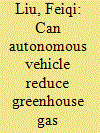| Srl | Item |
| 1 |
ID:
167024


|
|
|
|
|
| Summary/Abstract |
Autonomous vehicles are believed to be the next-generation technology for future societies. The energy and environmental impacts of autonomous vehicles have been realized to be important issues, but quantitative analysis is lacking. In this study, by using China's passenger vehicle fleet as an example, we evaluate the effects of autonomous vehicle deployment on greenhouse gas emissions in different scenarios of autonomous vehicle penetration rates and fuel consumption changes. A comprehensive literature review is conducted to support the study. Autonomous vehicles are found to potentially affect the total greenhouse gas emissions in multiple ways, including reducing vehicle ownership, increasing vehicle use intensity, and changing the vehicle fuel consumption rate. These impacts are mostly internally offset such that the overall impact of autonomous vehicle deployment on greenhouse gas emissions is not significant in the near-to mid-term. With a higher autonomous vehicle penetration rate achieved, in the optimistic scenario, a net reduction in greenhouse gas emissions is expected to be realized. In addition, the fuel economy levels of autonomous vehicles are highly uncertain and cause major uncertainties in the simulation results. More field tests and evidence are needed to improve the evaluation reliability.
|
|
|
|
|
|
|
|
|
|
|
|
|
|
|
|
| 2 |
ID:
098616


|
|
|
|
|
| Publication |
2010.
|
| Summary/Abstract |
A new fuel consumption standard for passenger vehicles in China, the so-called Phase 3 standard, was approved technically in 2009 and will take effect in 2012. This standard aims to introduce advanced energy-saving technologies into passenger vehicles and to reduce the average fuel consumption rate of Chinese new passenger vehicle fleet in 2015 to 7 L/100 km. The Phase 3 standard follows the evaluating system by specifying fuel consumption targets for sixteen individual mass-based classes. Different from compliance with the Phases 1 and 2 fuel consumption standards, compliance of the Phase 3 standard is based on corporate average fuel consumption (CAFC) rates for individual automobile companies. A transition period from 2012 to 2014 is designed for manufacturers to gradually adjust their production plans and introduce fuel-efficient technologies. In this paper, we, the designers of the Phase 3 standard, present the design of the overall fuel consumption reduction target, technical feasibility, and policy implications of the Phase 3 standard. We also explore several enforcement approaches for the Phase 3 standard with financial penalties of non-compliance as a priority. Finally, we estimate the overall effect of the Phase 3 standard on oil savings and CO2 emission reductions.
|
|
|
|
|
|
|
|
|
|
|
|
|
|
|
|